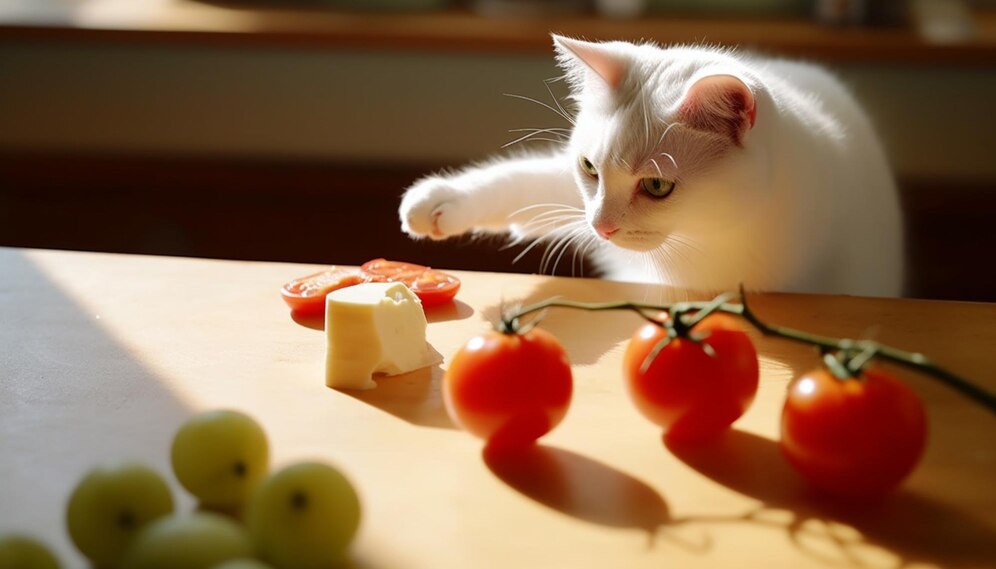For many cat owners, the curiosity of their furry friends about human foods, especially those as tempting as tomatoes, can be both endearing and worrisome. If you’ve ever wondered, “Can cats eat tomatoes?”, you’re not alone. Let’s dive into whether tomatoes are safe for cats, the potential risks, symptoms of toxicity, and safer alternatives to keep your feline happy and healthy.
Are Tomatoes Safe for Cats?
The short answer? It depends. Ripe tomatoes in very small amounts are generally considered safe for cats. However, parts of the tomato plant, such as the leaves, stems, and unripe (green) tomatoes, contain a substance called solanine, which is toxic to cats. Solanine belongs to a group of chemicals called glycoalkaloids, commonly found in plants in the nightshade family, like potatoes, peppers, and eggplants. Even though a tiny nibble on a ripe tomato likely won’t harm your cat, other parts of the plant could cause serious problems. Read Can Cats Eat Eggs?
Tomato Toxicity in Cats: Understanding the Risks
So, what exactly makes certain parts of the tomato plant dangerous for cats? The culprit is solanine. When consumed by cats, solanine can interfere with their nervous and digestive systems, leading to symptoms that may range from mild discomfort to severe illness. Here’s what you need to know about how tomato toxicity can affect cats and the symptoms you should watch for if your cat accidentally eats part of the tomato plant. Read Can Cats Eat Oranges?
Symptoms of Tomato Poisoning in Cats
If your cat ingests parts of the tomato plant that contain solanine, they might show symptoms within a few hours. Look out for these signs of tomato toxicity: Read Can Cats Eat Kale? Is Kale Safe for Cats?
- Lethargy or weakness
- Vomiting or diarrhea
- Excessive drooling
- Confusion or disorientation
- Lowered heart rate
- Stomach pain or discomfort
If you notice any of these symptoms, especially after your cat has had access to tomato plants, contact your veterinarian right away. Quick treatment can prevent symptoms from worsening and help your cat recover safely. Read Can Cats Eat Peas?
Are Ripe Tomatoes Safe for Cats to Eat?
Ripe tomatoes are considered less toxic than the green, unripe ones. In very small quantities, a ripe tomato isn’t likely to harm your cat, but it’s still best to avoid it. Cats don’t naturally crave tomatoes; they’re obligate carnivores, meaning they rely on meat-based diets for essential nutrients. Introducing tomato-based foods, sauces, or even fresh tomatoes may cause digestive issues, even if the tomato itself isn’t toxic. Plus, common ingredients in tomato-based products, like onions, garlic, and added salt, can be dangerous for cats. Read Can Cats Eat Pineapple?
While a few cat-safe fruits and vegetables like cucumbers or carrots can be beneficial treats, tomatoes just aren’t worth the risk. Read Can Cats Eat Cherries?
Why Cats Should Avoid Tomato-Based Products
It’s not just fresh tomatoes that could pose a risk. Cats should avoid all tomato-based products, such as ketchup, pasta sauce, and soups. These products often contain ingredients like onion, garlic, and extra salt, all of which are harmful to cats. Garlic and onions, in particular, are known to cause anemia in cats, leading to serious health problems if consumed over time.
To keep things simple: skip the sauces and condiments altogether. There are many other treats you can safely offer to your cat, and they won’t miss out by steering clear of tomatoes. Read Can Cats Eat Garlic? The Risks You Need to Know
What To Do If Your Cat Eats a Tomato
If you suspect your cat has eaten part of a tomato plant or an unripe tomato, observe them closely for any signs of distress. Check for symptoms like vomiting, drooling, or changes in behavior. If your cat exhibits any of these symptoms, contact your veterinarian immediately. Even if they seem fine, it’s better to consult a vet if they’ve consumed a significant amount of tomato. Read Can Cats Eat Cheese?
Safe Alternatives to Tomatoes for Cats
If you’re looking for nutritious treats that are completely safe for your feline friend, consider these options instead:
- Cooked Chicken: A lean protein that most cats love.
- Blueberries: High in antioxidants and safe in small amounts.
- Carrots: Cooked and cut into small pieces, these are packed with vitamins cats need.
- Pumpkin: Great for digestion; just make sure it’s plain, cooked, and free from added ingredients.
Final Verdict: Can Cats Eat Tomatoes?
While ripe tomatoes aren’t as dangerous as their green counterparts, they still aren’t ideal for cats. With other safe and healthy options available, it’s best to avoid tomatoes and stick to cat-friendly treats instead.
Read Further



